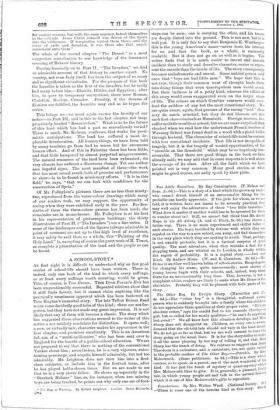A SCHOOL-STORY."
AT first sight it is difficult to understand why so few good stories of school-life should have been written. There is, indeed, only one book of the kind to which every suffrage, or at least every suffrage worth counting, would be given. This, of course, is Torn Brown. Then Dean Farrar's Eric has been unquestionably successful. Repeated editions show that it still finds favour, but it cannot claim anything like the practically unanimous approval which has been bestowed on Tom Hughes's immortal story. The late Talbot Baines Reed wrote some decidedly gcod tales of this kind ; these are not for- gotten, but they have not made any great impression. It is not likely that any of them will become a classic. The story which has suggested these observations seemed to the writer of this notice a not unlikely candidate for distinction. It opens well; a new, or virtually new, character makes his appearance in the first chapter, and promises excellently. This is an American lad, son of a "multi-millionaire," who has been sent over to England for the benefit of a public-school education. We are not prepared to say that there is nothing of the conventional Yankee about him ; nevertheless, he is a very vigorous, enter- taining personage, and acquits himself admirably, but not too admirably. Mr. Leighton does not turn him into a first- class cricketer, or include bins in the football team, after he has played half-a-dozen times. But we are made to see that he is a very clever fellow. He shows up especially in the "Sherlock Holmes line, as, for instance, when two missing boys are being tracked, he points out why only one set of foot- • The Boys of Waveney. By Robert Leighton. London : Grant Richards. Os.] steps can be seen ; one is carrying the other, and his traces are deeply dinted into the ground. This is not new, but it is well put. It is only fair to say that Benjamin K. Winthrop this is the young American's name—never loses his interest for us, and that the book, as a whole, is eminently readable. But it does not go on as well as it begins. The writer finds that it is much easier to invent and narrate incident than to study and describe character, easier to repre- sent the outside than the inside of life. The story consequently becomes melodramatic and unreal. Some unkind person said once that "boys are bad little men." We hope that this is not true, though their common want of thought leads them into doing things that even unscrupulous men would avoid. But their badness is of a petty kind, whereas the villain of this story would seem exaggerated even on the liner stage of life. The crimes on which Gambier ventures would over- load the evildoer of any but the most sensational story. We are quite aware, again, that persons of the racing "tout" class may do much mischief, but they do not blossom out into such first-class criminals as Hunnisett. Foreign masters, too, suffer no little trouble at school, but we are more surprised than shocked when we read how the unfortunate French teacher of Waveney School was found dead in a wood with a pistol bullet through his head. The chronicler of school-life must be content with less sensational incidents. That life is not incapable of tragedy, but it is the tragedy of wasted opportunities, of the "stumble on the threshold" which may be so hopelessly irre- coverable. That there are good things in the book we have already said; we may add that in some respects it is well above the average of its class. After all, the fault which we have pointed out is very common. Many good stories, or what might be good stories, are sadly spoilt by their plots.






















































 Previous page
Previous page